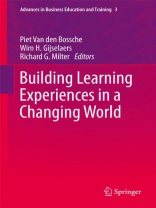Advances in Business Education & Training is a Book Series to foster advancement in the field of Business Education and Training. It serves as an international forum for scholarly and state-of-the-art research and development into all aspects of Business Education and Training.
This new volume deals with several aspects of the challenge to design learning in and for a changing world. The first part concerns program development. How to build curricula that are future-proof? Principles to innovate our curricula are identified. It answers the question how we can incorporate the need for change in our thinking about curriculum-development and identify the necessary elements to incorporate in our curricula. The second part focuses on the increasing diversity of students and employees within our schools and organizations, in terms of culture, language, and perception of ability, gifts, and talents. This offers a range of opportunities, but at the same time can possiblyjeopardize some processes that are taken for granted. Chapters in this part analyze the processes that play a crucial role in dealing with this diversity and identify educational practices that can help to harvest the potential that lies within this diversity. The third part of this book digs further into the possibilities that are opened up by the implementation of ICT-support in our learning environments. E-learning provides tools to adapt these environments to the needs of an increasingly diverse student-population. In the last part we focus specifically on the workplace and how learning can be designed in such a way that employees are equipped for a shifting workplace. On the one hand it is looked how training can affect performance in the workplace. Does learning transfer to the work environment? On the other hand it is questioned how one can design affordances to trigger learning in the workplace.
Inhoudsopgave
Preface.- Introduction.- Part I: Program development in a changing world .- 1. What type of knowledge is required in the business curriculum?.- 2. Managing classroom innovation: a primer for substantive and lasting curriculum change.- 3. How should service-dominated logic be applied to business education.- 4. Champlain MBA development of an MBA program based on integrated reflected practice.- Part II: Dealing with diversity .- 5. Learning from differences – a design principle for management education.- 6. Changes and trends in cross-cultural management education: An integrative approach.- 7. Academic and social integration of international and local students at five business schools.- 8. Exploring student attrition in PBL: tutor and student perceptions on student progress.- Part III: Increasing flexibility through technology .- 9. Transforming the business education value chain with e-learning technologies.- 10. The effects of virtual groups on learning outcomes in an ITV delivered international business course.- 11. Student learning preferences in a blended learning environment.- Part IV: Learning in a changing workplace .- 12. The effect of the trainees’ perception of the training design on transfer of training.- 13. The use of personal development plans in the workplace: a literature review.- 14. Transactive memory profiles and their influence on advice seeking.- Index.












